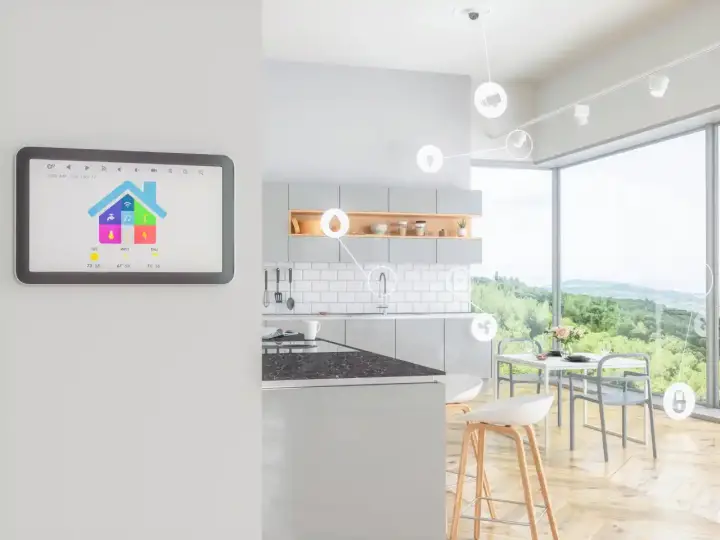The 4 Best Offline Smart Bulbs
Updated on 19th Jan 2021 17:34 in General, Smart
Many smart devices take advantage of your existing WiFi network to reduce cost and allow them to operate standalone from any sort of hub. Unfortunately, they don't just use WiFi as most products will then connect to a cloud service using the internet to allow you to control them. There are many problems with cloud smart devices ranging from privacy to reliability and even the fear of it being discontinued in the future, which often put people off. Not all products are like this though, and here is my list of the 4 best smart bulbs that don't use the cloud.

Disclaimer: This post contains affiliate links. As an Amazon Associate, I earn from qualifying purchases.
Table of Contents
Why avoid the cloud?
If you aren't familiar with the problems cloud devices have, you might be confused about why anyone would avoid them. Those that are already familiar with these shortcomings can skip ahead to the next section. If you are still confused, be sure to read on. Any cloud device will have some effect on your privacy as it transmits and receives data from a remote server which could be compromised at any time. The service provider could sell your information, or their systems could get hacked. Either way, your private information could be exposed. That's not to mention what could happen if a third party obtained control of your front door lock!
The other problem is often with reliability as most of these products rely completely on the internet to continue their operation. If your connection goes out, everything will stop working, and you won't even be able to turn the lights off! While it may seem unlikely, these events do happen and have happened to me on several occasions before I stopped using cloud devices. Sometimes it won't even be your fault at all as the service provider can have an outage which leaves you unable to control anything. Opinions on this vary greatly, but I believe we should be able to use the stuff in our homes regardless of what's going on outside, which is why I'm not a fan of cloud devices.
HomeKit
HomeKit is a protocol designed by Apple that runs offline natively meaning any compatible device will automatically work without an internet connection. You do need a HomeKit hub, but those aren't too difficult to set up using an Apple TV or a HomePod. It's worth mentioning that while HomeKit is amazing, it's also designed for Apple users. I recommend anyone wanting to try HomeKit at least have an iPhone for an optimal experience. Check out my article on using Home Assistant as a HomeKit hub if you want to get started!
Meross Smart Bulb
The bulb supports full RGB along with various color temperatures which can be configured in the Home app. It works without HomeKit as a cloud device but will switch to local operation when paired with your hub. Most of the cloud features are what you would expect, and it also supports Alexa and Google Home. I have personally used this bulb on multiple occasions, and it's seriously bright! It feels great to use and has a huge collection of colors you can choose from to make your space feel like yours.
Check out the Meross Smart Bulb on Amazon here!
Z-Wave
Z-Wave is a wireless mesh network standard where each node communicates with its neighbours directly, effectively extending the signal's total range. A hub is required to send and receive Z-Wave signals and can be obtained in various ways, my favourite being the Z-Stick. The stick plugs into a computer via a USB port and acts as a gateway for software to control the devices on the network. Read more about DIY Z-Wave controllers in my article on the subject here!
Leviton Decora Smart Dimmer
I know this is a smart bulb list, but Z-Wave bulbs are quite rare for some reason, so the best you can do easily is get a switch. Switches actually have quite a few advantages compared to bulbs mostly because they avoid the common problem of putting multiple bulbs into a single lamp. This switch will handle up to 600W and is a drop-in replacement for your existing switch. Keep in mind this switch requires a neutral wire so if your home doesn't have a neutral in the switch box, you should take a look at my article on the subject here. Another advantage is that the switch permits manual operation of the light without opening an app or using a voice command which isn't the case for bulbs.
Check out the Leviton Z-Wave Switch on Amazon here!
Zigbee
Zigbee is a wireless mesh network standard where each node communicates with its neighbours directly, effectively extending the signal's total range. It is quite similar to Z-Wave with the only differences being technical and a non-consideration for most users except in highly specific circumstances. The biggest difference that does affect everyone is that Zigbee is an open standard that everyone can use for any purpose. This makes things more complicated, as not all Zigbee devices will work with your Zigbee smart hub. Be sure to carefully research compatibility before buying Zigbee.
A hub is required, but many other devices now ship with a Zigbee hub that can probably be used. An example is the Echo hub, which includes a Zigbee hub inside it, allowing it to communicate directly with compatible devices. The Hue hub and bridge are both Zigbee hubs that can be used for certain other smart devices, whether they are from Hue or not. It isn't a supported use case so you probably shouldn't rely on this technique for anything serious though.
Innr Zigbee Smart Bulb
This bulb comes with all the bells and whistles you expect from smart bulbs while being compatible with Zigbee. It's much cheaper than other Zigbee bulbs such as Philips Hue and still delivers acceptable performance. All of the RGB colors are supported, and it even includes a dedicated white LED for better white light. The mesh functionality will make these much easier to install around the house than the WiFi bulbs, which must always be in the range of an access point. As long as other Zigbee devices are on the path to a location, you want to use the signal will always reach.
Check out the Innr Zigbee Smart Bulb on Amazon here!
Bluetooth
Bluetooth is a technology almost everyone is familiar with as it is often used for communication or music transmission. Did you know you can create a mesh network with it? Most people don't, and that's one of the reasons it is less common in smart homes. In the same way, Z-Wave or Zigbee can extend its range, each Bluetooth device on the network will extend its range. An important distinction is that not all Bluetooth devices can be used in this way, and only ones specifically labelled as such will work.
SYLVANIA Bluetooth Smart Bulb
These are about as basic as it gets, which isn't always a bad thing. They emit nice white light and support basic operations like on/off and dimming. You can use them with all of the big ecosystems like Google or Alexa, or you can just use the SYLVANIA app. They support Bluetooth mesh which is the perfect no-hassle solution for offline smart devices. Your phone can connect to it directly, avoiding the need for a hub and keeping things simple. A common problem with Bluetooth is that it has rather limited ability to penetrate solid materials which can make it difficult to use in some homes.







